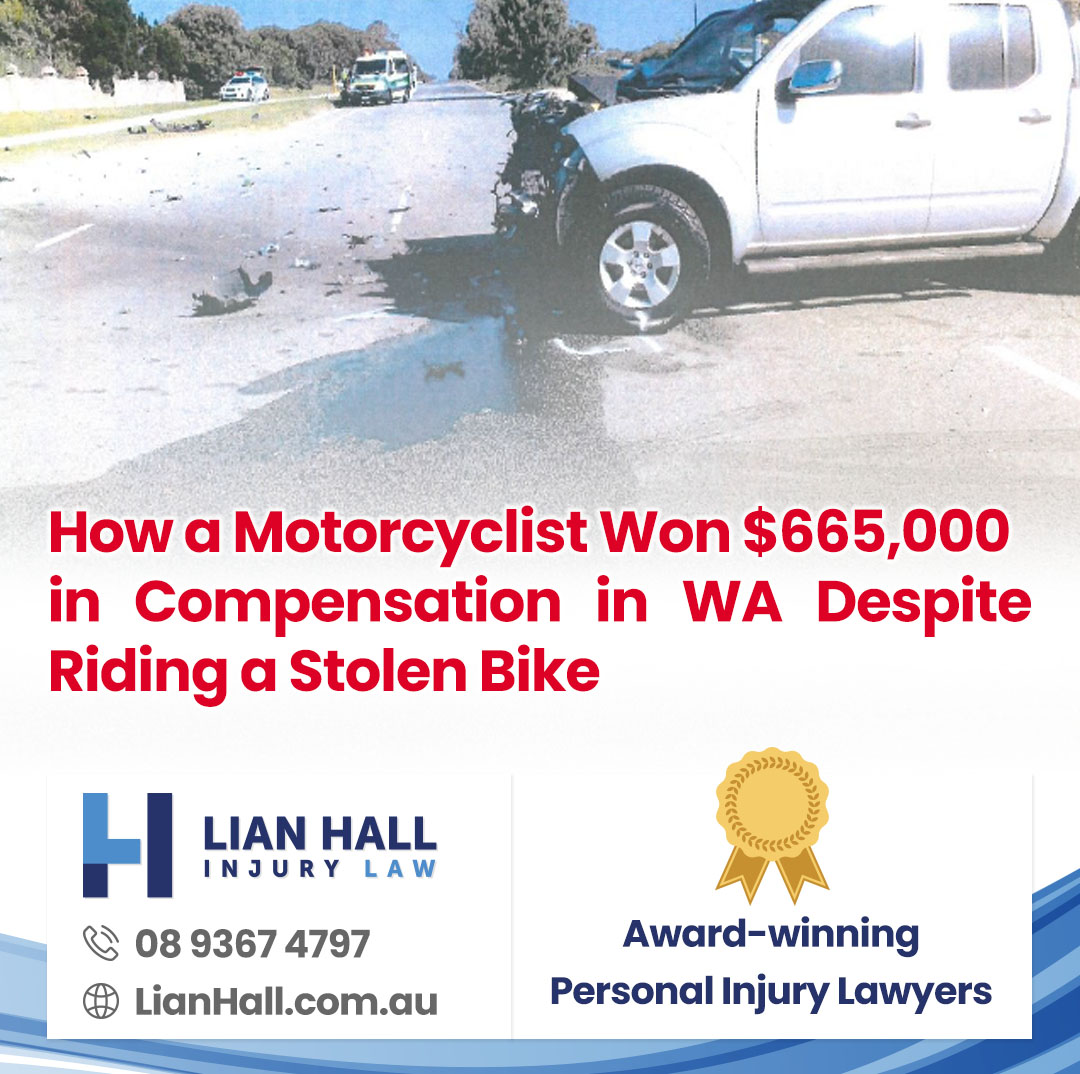Car Accident Compensation: Riding a Stolen Motorcycle and Wins $665,000
The District Court of Western Australia recently awarded $655,000 to the rider of a stolen motorbike who hit a ute while riding well in excessive of the speed limit.
In Howard v Lyndon [2023] WADC 99, the plaintiff was riding an unregistered Kawasaki Ninja motorcycle south on Marmion Avenue in Mindarie in Western Australia. He was riding at significant speed in the Right-hand lane when a Nissan ute, traveling in the opposite direction, turned right into a break in the median strip, intending to turn into the Tamala Park recycling center. The ute driver stopped, but his ute was encroaching into the right-hand lane of the southbound traffic. The motorcycle was about 50m from the ute when the ute pulled into the break in the median strip. The bike hit the ute and the motorcycle rider suffered serious injuries.
![Car Accident WA - Howard v Lyndon [2023] WADC 99](https://www.lianhall.com.au/wp-content/uploads/2023/09/Car-Accident-WA.png)
Was the ute driver negligent?
All drivers owe a duty of care to other drivers on the road to take care to drive in a safe way. The ute driver owed a duty of care to keep a proper lookout and to check for oncoming traffic before turning. The Court had no problem in saying that by turning right and by stopping with the nose of his ute encroaching into the southbound lane that the ute driver was negligent.
But the ute driver looked and didn’t see the motorcycle so why was he negligent?
The ute driver argued that when he pulled into the break in the median strip and stopped, that he looked and didn’t see the motorcyclist. This is an argument that we often hear at Lian Hall Injury Law: drivers argue that they looked and there was not traffic and so it was safe to drive, but suddenly somebody hit them and therefore the other car must have been driving too fast. The Court rejected that argument. The Court said that there was a long uninterrupted view up the road, and that if the ute driver had looked then he would have seen the motorcyclist. Therefore the ute driver was to blame for the accident. He had failed to keep a proper lookout.
But the motorcycle was being ridden at an excessive speed.
The ute driver’s insurance company argued that:
- The motorcycle rider was to blame for his own accident because he was riding at an excessive speed; and
- The motorcycle rider was not allowed to make a claim because he was riding a stolen motorcycle.
There were a number of witnesses who all said that the motorcyclist had been riding too fast. In particular, a car heading in the same direction saw the motorcyclist pass them and the passenger looked at their speedometer of his car. The Court was impressed by his evidence and concluded that indeed the motorcyclists had been riding way too fast. Although there was no evidence as to what speed the motorcyclist was actually riding, the Court was able to decide that no matter whatever the speed, his speed was in excess of what was safe. But still, there was the question: so what? Even if he had been riding too fast, could the motorcyclist have done anything to avoid a crash with a ute that suddenly pulled out in front? The Court said that no matter the speed, that speed was a contributing factor and therefore the motorcyclist was partly to blame for the accident. The Court deducted 30% from his claim.
But he was riding a stolen motorbike
Interestingly the lawyers for the Insurance Commission of Western Australia also argued that the motorcyclist was not allowed to be paid compensation because he was riding a stolen motorbike. The provisions of s5(1) of the Offenders Act say that if somebody is injured while committing an indictable offense then they cannot complain if they get injured and they cannot claim compensation. In particular, the lawyers for ICWA argued that:
- The claimant was riding a motorbike without the consent of the owner; and
- He knew that the motorcycle was stolen; and
- He was in possession of stolen property (the motorcycle).
The Court said that whether a person knew that something was stolen is a subjective matter, not an objective matter ie: the insurance company still needs to prove that the motorcyclist actually knew, NOT should have known, that the motorcycle was stolen.
In this case, there was no doubt that the motorcycle was stolen.
However, ICWA failed to prove that the motorcyclist knew that it was stolen or that he should have suspected that it was stolen. As such the defence failed and the Court gave the motorcyclist compensation of $665,000.










